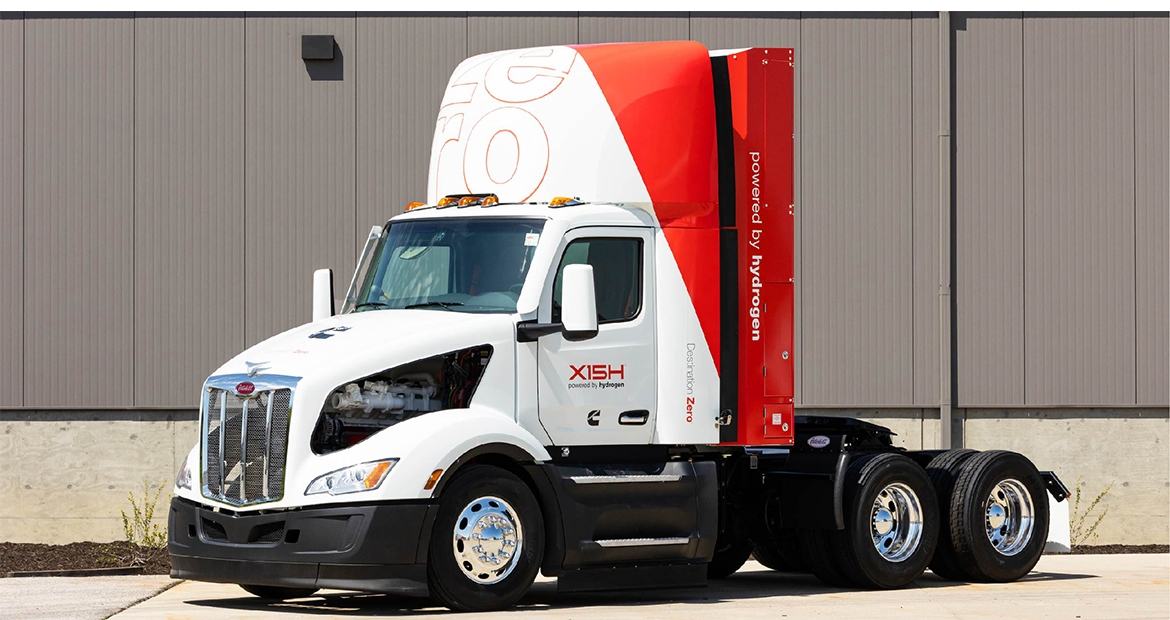CAN AN ENGINE RUN ON HYDROGEN?
2023-06-16 16:18:55

Companies working to achieve their decarbonization goals are increasingly interested in hydrogen engines. Over the past year, leading companies like Tata Motors, Buhler Industries and Werner Enterprises have expressed interest in Cummins 15-liter hydrogen engine. More leading companies can take advantage of hydrogen-powered solutions to decarbonize as these technologies become more cost-friendly and widely available.
IS THERE AN ENGINE THAT RUNS ON HYDROGEN?
Yes. Hydrogen internal combustion engines (hydrogen ICE) work similarly to diesel engines. Hydrogen is burned in the same way a traditional internal combustion engine burns gasoline or diesel. Hydrogen engines have near zero emissions, and they don’t emit soot or volatile organic compounds. In fact, hydrogen engines can deliver over 99% reduction in carbon emissions compared to diesel. It’s considered a zero-carbon technology.
Cummins is leading the way in the transportation industry with its hydrogen internal combustion engines. These engines are being developed with current vehicle designs in mind and aim to make the transition to hydrogen simple for OEMs and their customers. Cummins’ fuel-agnostic platform includes both a 15-liter and 6.7-liter hydrogen engine. This offers the benefits of a common-base architecture and low-to-zero carbon fuel capability. So, will we ever see a hydrogen truck anytime soon?
The 15-liter hydrogen internal combustion engine is expected to reach full production in 2027. To date, Cummins has debuted two hydrogen ICE concept trucks. One was a heavy-duty concept truck featuring the X15H, and the other was a medium-duty concept truck powered by the B6.7H. Both concepts truck replicates a feasible vehicle production and demonstrates an easy integration fit with no impact on payload or space requirements. The heavy-duty truck is expected to have an operating range of more than 500 miles and reach 500 HP. It has a 700 bar pressure 80kg high-capacity hydrogen storage system.
This medium-duty engine is expected to reach around 290 HP and 1200Nm peak torque. Cummins is aiming for similar performance characteristics of a diesel engine that are compatible with existing transmissions, drivelines and cooling packages.
DO HYDROGEN ENGINES NEED SPARK PLUGS?
Yes. Hydrogen ICE needs spark plugs. The hydrogen combustion process is similar to engines that use natural gas, or gasoline. Hydrogen is stored in high-pressure tanks and is fed into the engine's combustion chamber where it is mixed with air. A spark plug ignites the mix, which rapidly combusts. The pressure created in the combustion chamber moves the pistons, which drives the crankshaft, causing a rotating motion. Because of the need for spark plugs, it is crucial to follow the recommended maintenance intervals, which may differ from those of diesel vehicles.
CAN DIESEL ENGINES RUN ON HYDROGEN?
No. While vehicles with diesel ICEs share a lot in common with hydrogen ICEs, a diesel ICE cannot run on hydrogen alone. Diesel ICEs operate on a compression-ignition cycle, and thus, feature no spark plugs. Whereas, hydrogen ICEs operate on a spark-ignition, and as such, require spark plugs to ignite fuel.
Additionally, H2-ICEs incorporate a number of features that are required for safe and efficient operation. This includes high-pressure storage tanks which undergo rigorous industry standard testing and certification. Cummins and NPROXX announced a joint venture to deliver industry-leading hydrogen storage options. The two engines also have very different exhaust aftertreatment systems. A diesel ICE exhaust system is designed to reduce NOx and particulate matter emissions. In contrast, a hydrogen ICE exhaust system is simpler because of the lower NOx and virtually no particulate matter emissions.
WHAT ARE THE SIMILARITIES BETWEEN DIESEL AND HYDROGEN ENGINES?
Diesel and hydrogen engines do have similarities, though. To take full advantage of the similarity between these engines and to create optimal solutions for its customers, Cummins is developing fuel-agnostic engine platforms. These platforms consist of a base engine architecture around which a set of engines optimized for different fuels can be built. Each engine will then operate using a single fuel. This approach makes it easier for OEMs to offer versions of the same vehicle operating on different fuels.
End-users operating mixed-fuel fleets also benefit from using engines derived from the same platform. The high degree of parts commonality, for example, makes it easier to manage parts inventory and communize on maintenance practices.
Customer interest in hydrogen engines is growing. Companies and fleets that use Cummins’ fuel-agnostic engine technology will be well-positioned to transition to a hydrogen-powered fleet as hydrogen fuel becomes a more widely available. Though hydrogen vehicles will use different fueling systems and onboard storage for hydrogen, mechanics and drivers will already have some familiarity with the engines. This journey to adopting hydrogen-fueled vehicles is much more economical than starting from scratch.
Cummins stands ready to partner with customers interested in transitioning to hydrogen-powered vehicles and helping them decarbonize and achieve their environmental goals. If you are interested in learning more, don’t forget to check out answers to frequently asked questions around hydrogen engines.

